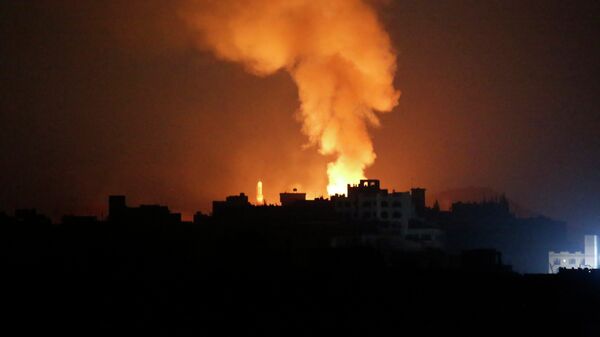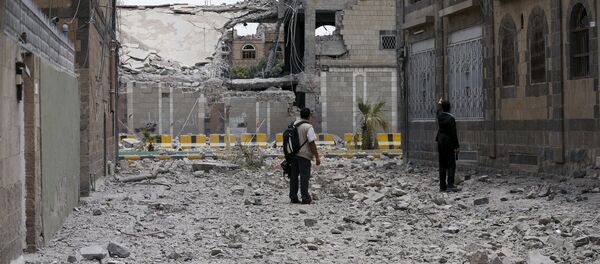Commenting on the apparent breakthrough, Tehran-based political scientist Shoeib Bahman of the Institute of Iran and Eurasia Studies told Sputnik that the ceasefire is the result of Riyadh's utter failure in accomplishing any of its goals in Yemen, but warned that Saudi Arabia will attempt to continue the war by other means.
Bahman noted that "while planning its attack on Yemen, Saudi Arabia expected a quick war ending in victory. As we can now see, this did not happen." The expert explained that there are several reasons why the planned for victory has turned into a three-month long quagmire.
"Firstly, the Saudis' so-called allies in the military coalition, including Turkey, Pakistan and Egypt, refused in the end to participate in military operations against the Yemenis. And while Riyadh had no choice but to continue its bombing campaign, these strikes have not brought the desired results for the coalition."
In this situation, the expert explained that "there is only one option: the undertaking of a ground operation. But this path seems destined to fail." Bahman noted that if Saudi Arabia does launch a ground campaign, it not only risks suffering defeat at the Houthis' hands, but also faces being sucked "into a real 'swamp' of war for many, many years."
"Therefore, Saudi Arabia has now found itself in an impasse. Now the country has no choice but to accept one of the proposed plans for a ceasefire. This signifies a defeat for Saudis, who haven't been able to achieve any of their aims in this conflict."
The expert believes that Riyadh's agreement to a ceasefire also demonstrates the effectiveness of international efforts toward the peaceful settlement of the Yemeni conflict, and in particular those of Iran and Russia. Bahman notes that from the beginning, Moscow and Tehran took constructive positions and made serious diplomatic steps to return peace to the conflict-torn nation.
"Immediately following Saudi Arabia's attack on Yemen, Iran and Russia began actively supporting the cessation of the air strikes, calling on national dialogue between the opposing sides. Given the fact that Saudi Arabia has not been able to achieve any of its stated goals, it is safe to Iranian and Russian efforts to implement a plan for peace for the Yemeni conflict has been an unqualified success. This is undoubtedly a victory of diplomacy."
Bahman is concerned that despite the ceasefire, Saudi Arabia will be unlikely to simply accept defeat, noting that Riyadh may attempt to use divisions in the country to plunge the country further into civil war.
"Given the fact that a continuation of attacks on Yemen by the Saudi Air Force may have negative and unpredictable consequences for the Kingdom, it is unlikely that they will be resumed with the same intensity as a before. In both the short and the long term, Saudi Arabia will likely try to drag out the Yemeni civil war, playing on tribal contradictions. The instruments for doing so include the revitalization of Al-Qaeda in the Arabian Peninsula, which is supported by the Saudis, who are likely to wage war against the Houthis from the Ansar Allah movement. Additionally, this may include [pressures and incentives] on individual Yemeni tribal leaders, aimed at creating a split in Yemeni society, which will lead to a bitter civil war."
Since early 2015, Yemen has been mired in violence sparked by fighting between Houthis, the country’s main opposition group, and government forces, backed by a Saudi-led coalition of Arab states, which launched airstrikes in Yemen in March. According to the United Nations, some 3,000 Yemenis, half of them civilians, have been killed in ongoing fighting over the past three months.





